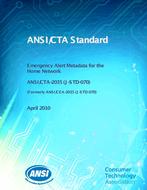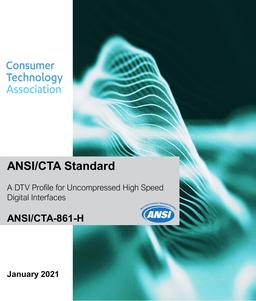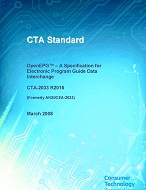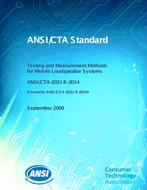
CTA 2035 (J-STD-70)
- Comments Off on CTA 2035 (J-STD-70)
- CTA
Click here to purchase
CEA-2035/DVS-847 standardizes metadata elements describing emergency alert events to devices in a home network, for applications involving the delivery of Commercial Video Services into the home network. Commercial Video Services are sources of audio/video content provided as live or on-demand streams from a particular service provider. Other standards define emergency alert signaling for digital cable receiving devices (ANSI J-STD-042-A [2]) and for IPTV terminal devices (ATIS-0800012 [1]). Receiving devices in the home with access to Commercial Video Services may wish to place such content on a home network. CEA-2035/DVS-847 defines a metadata format usable by these receiving devices to notify client devices in the home network of emergency alert information including text, audio and specific details about the alert (such as originator and event code, severity, etc.). Some types of alerts are urgent enough that they trigger client devices to immediately switch to another channel offered by that service provider which is a source of live audio/video describing details of the alert (the “Details Channel”). The metadata format described here provides a pointer to the Details Channel for such cases. When outputting live programming on a channel defined in the schema as an “Exception Channel,” client devices remain tuned to that channel to receive details of the alert. Note that CEA-2035/DVS-847 does not specify required receiver behavior. Guidelines for the use of the metadata standardized here, such as those developed by the Digital Living Network Alliance (DLNA), specify these requirements. The purpose of CEA-2035/DVS-847 is to standardize the delivery format and syntax and semantics of the emergency alert metadata, specified here in the form of an XML Schema and associated element definitions. Note also that CEA-2035/DVS-847 does not describe transport protocols and methods for the delivery of the emergency alert metadata in the home network. These aspects of the system definition are specified in other guidelines and standards. See for example DLNA guidelines on this topic. Users of this standard should be aware that EAS is a topic which is subject to regulation and is currently under consideration by the Federal Emergency Management Agency (FEMA). It should further be noted that service providers may not always provide emergency alert information in a format that is identifiable or translatable to the format required for redistribution within the home network as defined within this document.
Product Details
- Published:
- 04/01/2010
- ANSI:
- ANSI Approved
- Number of Pages:
- 22
- File Size:
- 1 file , 780 KB



